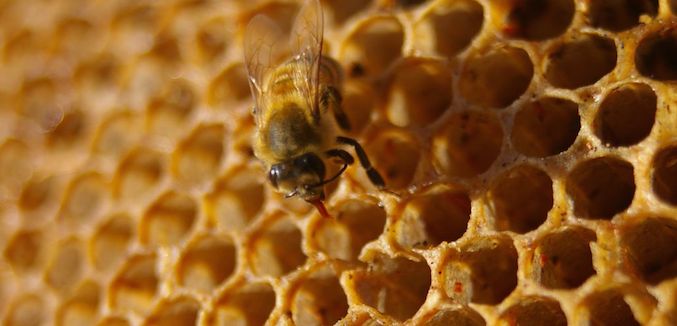Here’s some sweet news: The military conflict with Gaza won’t put a sting on honey availability in Israel. About 1,600 tons of honey is consumed by Israelis every Rosh Hashana to symbolize the hope of a sweet Jewish New Year ahead. And despite the sticky situation in the south, Israel’s annual Honey Festival began as planned on August 22 and runs through September 27 at apiaries across the country.
Beekeepers are offering educational and fun activities for adults and children about honey production from bee to jar, as well as tastings of the different types of honey made domestically. Israeli Honey Board CEO Hertzel Avidor tells ISRAEL21c that this year’s season ended a little earlier than usual because of the dry winter, so beekeepers were finished collecting honey before the start of Operation Protective Edge. Unfortunately, the winter drought led to a yield of less than 3,000 tons. In a rainy year, Israel’s 100,000 commercial hives at about 450 apiaries from Beersheva to Metulla produce an average 3,500 tons of honey. To satisfy Israel’s sweet tooth for 4,000 tons per year, additional honey is imported. Avidor says the weather has been a much larger problem than the war, honey-wise.
The largest concentration of apiaries is in the north due to its more conducive climate. Some Gaza-area apiaries, particularly Kibbutz Yad Mordechai and Kibbutz Erez, sustained damages – mainly from the heavy vehicles of the Israel Defense Forces rolling through. And because the IDF closed border areas to civilians, beekeepers weren’t able to go out and tend the hives as usual.
Yad Mordechai in the south and kibbutzim Ein Harod and Dan in the north are Israel’s largest honey producers. About 10% of the honey blend sold under the Strauss Group’s best-selling Yad Mordechai brand comes from the kibbutz of the same name. “The other 90% comes from other beekeepers all over the country,” Avidor explains.
Strauss spokeswoman Anat Confortes tells ISRAEL21c: “Tzuk Eitan [Protective Edge] has definitely made things more complicated, but there is no long-run effect for now. We are not expecting a honey shortage and the [Yad Mordechai] factory is working as usual in accordance with instructions from the Home Front Command.”A visit to the Yad Mordechai Strauss plant the day after the ceasefire confirmed that production is buzzing along, just two kilometers from Gaza. (via Israel21c)
[Photo: Peter Shanks / Flickr]




